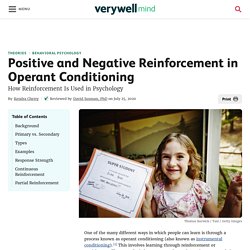

Skinner’s Operant Conditioning: Rewards & Punishments. What Is Reinforcement in Operant Conditioning? One of the many different ways in which people can learn is through a process known as operant conditioning (also known as instrumental conditioning).1 This involves learning through reinforcement or punishment.

The type of reinforcement used can play an important role in how quickly a behavior is learned and the overall strength of the resulting response. Understanding Reinforcement. Learning: Schedules of Reinforcement. The Study of Punishment in Psychology. Punishment is a term used in operant conditioning to refer to any change that occurs after a behavior that reduces the likelihood that that behavior will occur again in the future.

While positive and negative reinforcements are used to increase behaviors, punishment is focused on reducing or eliminating unwanted behaviors. Punishment is often mistakenly confused with negative reinforcement. The difference: Reinforcement increases the chances that a behavior will occur and punishment decreases the chances that a behavior will occur. Operant conditioning explanatory diagram for positive and negative reinforcement and punishment. Learning: Negative Reinforcement vs. Punishment.
12. The Power of Positive Reinforcement at Home and in the Classroom. Positive Reinforcement - Tips for teaching and parenting. The Use of Reinforcement and Punishment in Shaping a Child's Behavior. Reward Vs. Punishment: Which One is More Effective? Let's Discuss - Psychologenie. Which Is Better, Rewards or Punishments? Neither. “I feel a sense of dread as bedtime rolls around. Here we go again.” A dad said this in our family therapy office one day, describing his son’s pre-bed antics. The child would go wild as bedtime approached, stubbornly ignoring his parents’ directions and melting down at the mention of pajamas. The parents felt frustrated and stumped. How to raise successful kids.